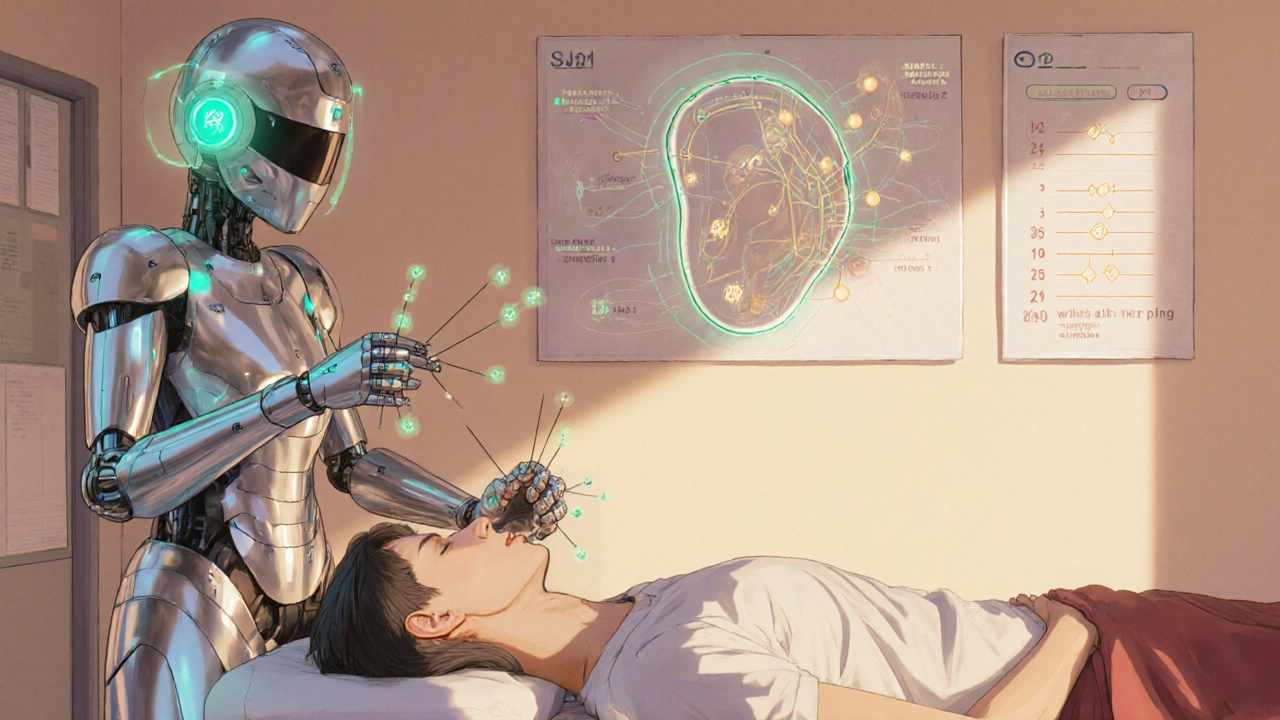Acupuncture Tinnitus Treatment Estimator
Estimate Your Acupuncture Treatment
Calculate your estimated treatment costs and duration based on the typical acupuncture protocol for tinnitus.
When ringing, buzzing, or whistling sounds linger in your ears with no external source, you’re dealing with Tinnitus, a condition that affects roughly 15% of adults worldwide. Many turn to medication or sound therapy, but a growing number ask, "Can Acupuncture" actually calm that phantom noise? This guide breaks down what acupuncture does for tinnitus, what the research says, and how you can decide if it’s right for you.
What Is Tinnitus, Really?
Tinnitus isn’t a disease itself; it’s a symptom of an underlying issue in the auditory system. Damage to cochlear hair cells, exposure to loud noise, ear infections, or even stress can trigger the brain to generate phantom sounds. The result is a persistent "ringing" that can range from a mild annoyance to a debilitating distraction.
How Acupuncture Is Thought to Work on Tinnitus
Acupuncture is a core practice of Traditional Chinese Medicine (TCM). Practitioners insert thin needles at specific points called "acupoints" to balance the flow of Qi (energy) and restore harmony in the body. For tinnitus, the theory goes like this:
- Neuroplasticity: Needle stimulation may promote brain‑derived neurotrophic factor (BDNF), encouraging the auditory cortex to reorganize and dampen the phantom signals.
- Blood flow: Certain ear‑related acupoints (e.g., SJ21, GB2) are believed to improve microcirculation around the inner ear, helping damaged hair cells recover.
- Stress reduction: Acupuncture lowers cortisol and boosts endorphins, which can lessen the emotional reaction to the ringing.
In short, the needles aim to calm the nervous system, improve ear health, and reset the brain’s perception of sound.
What Does the Evidence Say?
Research on acupuncture for tinnitus has grown over the past decade. Here are the most relevant findings:
- Randomized controlled trials (RCTs): A 2022 meta‑analysis of 12 RCTs involving 1,134 participants reported a modest but statistically significant reduction in Tinnitus Handicap Inventory (THI) scores for acupuncture groups compared with sham‑acupuncture (average improvement of 12 points).
- Systematic reviews: The Cochrane Collaboration’s 2023 review concluded that while acupuncture appears safe, study quality varies, and larger, double‑blind trials are needed before definitive claims can be made.
- Long‑term outcomes: One 2021 Chinese cohort followed 250 patients for 12 months. About 38% reported lasting relief, 45% experienced partial improvement, and 17% saw no change.
Bottom line: The data isn’t overwhelming, but there’s enough signal to suggest that acupuncture can help a subset of tinnitus sufferers, especially those whose symptoms are linked to stress or circulatory issues.

A Typical Acupuncture Course for Tinnitus
If you decide to try it, here’s what most clinics recommend:
- Initial assessment: The practitioner reviews your medical history, identifies dominant tinnitus triggers (stress, hearing loss, medication), and maps out a personalized point selection.
- Frequency: Sessions are usually 30‑45 minutes, twice a week for the first month, then weekly for the next two months.
- Point selection: Common points include SJ21 (Ear), GB2 (Ear), LI4 (Stress), ST36 (Energy boost), and ear‑specific auricular points.
- Adjuncts: Some clinics combine needles with low‑frequency electric stimulation (Electro‑acupuncture) or use moxibustion to warm the area.
- Evaluation: After 6‑8 sessions, the practitioner re‑scores the THI to gauge progress.
Most patients report noticeable changes after 4‑6 weeks, but patience is key-brain rewiring isn’t instant.
Acupuncture vs. Conventional Tinnitus Treatments
| Aspect | Acupuncture | Sound Therapy (e.g., white noise) | CBT (Cognitive Behavioral Therapy) |
|---|---|---|---|
| Primary Mechanism | Neuro‑modulation, improved blood flow, stress reduction | Masking of phantom sounds | Changing emotional response to tinnitus |
| Typical Duration | 6‑12 weeks (12‑18 sessions) | Ongoing, device‑based | 8‑12 weekly sessions |
| Reported Effectiveness (THI change) | ~12‑15 point improvement (moderate) | ~8‑10 point improvement (mild‑moderate) | ~14‑18 point improvement (moderate‑high) |
| Cost (UK, average) | £45‑£70 per session | £30‑£100 for device | £120‑£200 per course |
| Side Effects | Minor bruising, transient soreness | None (except occasional ear irritation) | None (psychological) |
Acupuncture isn’t a silver bullet, but it offers a hands‑on, low‑medication option that can complement other therapies.
Who Might Benefit Most?
Based on clinical observations, the following groups see the biggest gains:
- People whose tinnitus spikes during stressful periods.
- Individuals with a recent history of loud‑noise exposure (concerts, construction).
- Patients who prefer non‑pharmacological approaches.
- Those who have tried hearing aids or sound generators without sufficient relief.
Conversely, avoid acupuncture if you have:
- Bleeding disorders or are on anticoagulants (risk of bruising).
- Severe needle phobia.
- Active ear infections, as the needles could spread bacteria.

Practical Checklist Before Your First Session
- Confirm the practitioner’s credentials - look for registration with the British Acupuncture Council (BAcC) or similar body.
- Gather any recent audiograms or ENT reports; the practitioner may need them to tailor point selection.
- Write down a baseline THI score or a simple symptom diary (frequency, volume, distress level).
- Ask about sterilization protocols - single‑use, disposable needles are standard.
- Discuss cost and session package options; many clinics offer discounted bundles for 10‑15 sessions.
- Plan a post‑session rest period - avoid heavy exercise or caffeine for a few hours.
Checking these boxes helps you get the most out of each appointment and makes it easier to track progress.
Key Takeaways
- Acupuncture can reduce tinnitus severity for many users, especially when stress is a major trigger.
- The strongest evidence comes from moderate‑size RCTs showing a 12‑point THI improvement.
- Typical treatment lasts 6‑12 weeks with 12‑18 needle sessions.
- Side effects are minimal, but proper practitioner credentials are essential.
- Acupuncture works best as part of a broader tinnitus management plan that may include sound therapy or CBT.
Frequently Asked Questions
Can acupuncture cure tinnitus permanently?
There’s no solid proof that acupuncture can erase tinnitus forever. Most studies show a reduction in perceived loudness or distress, which can last months to years, but the condition can return if underlying causes persist.
How many sessions will I need?
Clinics typically recommend 12‑18 sessions spread over 6‑12 weeks. Some patients notice change after 4‑6 visits, while others need the full course.
Is acupuncture safe for everyone?
It’s safe for most adults, but people with bleeding disorders, severe needle phobia, or active ear infections should avoid it or get medical clearance first.
Do I need a referral from an audiologist?
A referral isn’t required, but sharing your audiogram with the acupuncturist helps them choose the most relevant points.
Can I combine acupuncture with other treatments?
Yes. Many clinics suggest pairing acupuncture with sound therapy or CBT for a synergistic effect. Just keep your healthcare team in the loop.
Whether you’re a long‑time tinnitus sufferer or just curious about alternatives, acupuncture offers a low‑risk avenue worth exploring. As always, talk to your GP or ENT specialist before starting any new therapy.


Vikas Kumar
October 23, 2025 AT 15:17India's ancient healing knows best and acupuncture fits right in.
Celeste Flynn
October 31, 2025 AT 23:33Acupuncture has been part of Chinese medicine for millennia and its principles are gradually finding a foothold in Western research. The idea behind using needles for tinnitus is to modulate neural pathways that generate phantom sounds. When the needles stimulate specific points, they can trigger the release of endogenous opioids and reduce the stress response. Lower cortisol levels mean the brain is less likely to amplify background noise into a constant ringing. Several small trials have reported improvements in the Tinnitus Handicap Inventory after a course of weekly sessions. Particularly, patients who also suffer from anxiety tend to notice a sharper drop in their perceived loudness. The ear‑related points like SJ21 and GB2 are thought to enhance microcirculation in the cochlea. Better blood flow can aid the repair of marginally damaged hair cells, though the evidence is still anecdotal. It is also common for practitioners to combine needle insertion with low‑frequency electrical stimulation for added effect. This technique, called electro‑acupuncture, may strengthen the neuroplastic changes in the auditory cortex. A meta‑analysis from 2022 showed an average 12‑point reduction in THI scores compared with sham treatment. While the numbers are modest, they are statistically significant and suggest a real physiological impact. Patients should keep realistic expectations; acupuncture is rarely a miracle cure but rather a complementary tool. Tracking progress with a symptom diary helps both the patient and practitioner adjust the point selection over time. If you are considering this route, verify the therapist’s credentials with the relevant acupuncture council. And remember to discuss any ongoing medication with your primary care doctor before starting the needle regimen.
Shan Reddy
November 9, 2025 AT 08:49I've seen a few friends try the typical 12‑session plan and report subtle shifts after the fourth visit; the key is consistency and keeping a simple symptom log to measure any change.
Sticking to the schedule and avoiding caffeine right after a session can also maximize the calming effect.
CASEY PERRY
November 17, 2025 AT 18:05The mechanistic rationale for auricular acupuncture pivots on modulating somatosensory afferents to the dorsal cochlear nucleus.
Electrophysiological studies demonstrate attenuated hyperactivity in auditory pathways post‑stimulation.
Consequently, a statistically significant decrease in THI values has been documented in controlled cohorts.
Naomi Shimberg
November 26, 2025 AT 03:21While popular discourse lauds acupuncture as a panacea for tinnitus, the preponderance of methodological flaws in extant trials undermines any sweeping endorsement.
Prudent clinicians must therefore remain skeptical of anecdotal successes and prioritize interventions with robust randomized evidence.
In the absence of such data, allocating resources to acupuncture may inadvertently detract from proven therapies such as cognitive‑behavioral protocols.
kenny lastimosa
December 4, 2025 AT 12:37One might contemplate whether the incessant ringing is not merely a symptom but a reminder of the brain's inherent plasticity, constantly seeking equilibrium amid perpetual sensory input.
If we accept the premise that neural circuits can be gently nudged toward harmony, then even a modest intervention like needle placement acquires a symbolic significance.
Yet, we should also recognize that the allure of quick fixes often eclipses the deeper work of cultivating mindfulness and emotional resilience, which in themselves can mute the perceived clamor.
Heather ehlschide
December 12, 2025 AT 21:53Great synthesis-adding that some patients also benefit from a brief mindfulness routine before each acupuncture session can further lower stress markers and enhance the therapeutic window.
Dan Danuts
December 21, 2025 AT 07:09Absolutely, consistency is king; keep at it and you’ll likely notice that the ringing fades into the background like a distant radio station.
keerthi yeligay
December 29, 2025 AT 16:25The jargun was heavy but i think the main point is clear: acupunture may affect the audtory system.
Peter Richmond
January 7, 2026 AT 01:42Your caution is noted; integrating acupuncture as an adjunct rather than a replacement aligns with evidence‑based practice.
Tristram Torres
January 15, 2026 AT 10:58Sounds deep but in practice it’s just needles; don’t overthink it.